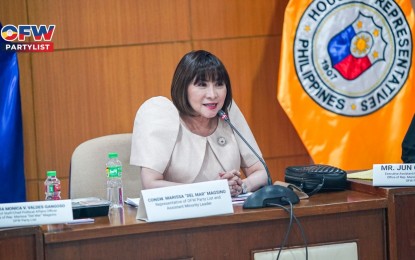
OFW Party-list Rep. Marissa “Del Mar” Magsino (Courtesy of OFW Party-list)
MANILA – A policy dialogue on Monday showed the need to implement urgent revisions in the implementation of the Inter-Agency Medical Repatriation Assistance Program (IMRAP).
IMRAP, under Joint Memorandum Circular (JHC) No, 2017-0001, includes the medical repatriation of migrant workers, documented and undocumented, and other Filipino nationals and their dependents abroad, including those facilitated through the insurer, employer, agency, sponsor, or any third party, and those without proper coordination with relevant government agencies.
The mechanism mandates the assistance of participating agencies from pre-arrival to post-arrival, including welfare assistance and reintegration assistance.
OFW Party-list Rep. Marissa “Del Mar” Magsino, who facilitated the dialogue, said they saw the need to reassess and revise the IMRAP considering the establishment of the Department of Migrant Workers (DMW) in 2021 and the lessons learned from past global public health crises.
“The rapidly evolving work settings abroad with health implications also call for a revisit of the program's guidelines to align with the current realities and challenges of medical repatriation for Overseas Filipinos (OFs) and Overseas Filipino Workers (OFWs). There is also a need to streamline existing procedures, and enhance inter-agency coordination among participating government entities,” she said in a news release.
The IMRAP mechanism mandates the assistance of participating agencies from pre-arrival to post-arrival, including welfare assistance and reintegration assistance.
The assistance includes in-flight medical assistance and escort services; initial medical assessment /evaluation upon arrival in the country; ambulance conduction; referral to and/or confinement in Department of Health (DOH) or local government unit or state universities or colleges-managed hospitals; financial assistance for payment of hospitalization and other medical expenses; Philippine Health Insurance Corporation assistance/benefits; and welfare programs and psychosocial counseling.
"Although IMRAP was greatly beneficial during the pandemic, we have also learned valuable lessons from its implementation. Based on our own experiences as we help repatriate OFWs, we also observed some gaps in the mechanism, which should be addressed in the amendments,” Magsino noted.
The gaps in the mechanism include miscommunication or non-coordination between and among the agencies, and the lack of supplementary support to the OF/OFW upon return such as welfare assistance or reintegration assistance, she said.
The dialogue was conducted by virtue of House Resolution No. 1373 the lady solon recently filed urging for an inquiry into the implementation of the program.
She pointed out that the dedicated wards in DOH-retained tertiary hospitals are not being followed, thus forcing OFWs to transfer to private hospitals due to bed unavailability, compelling them to cover their own healthcare expenses.
Also discussed was the possibility of expanding the program to include repatriations of distressed OFs and OFWs, and not necessarily limited to medical repatriation.
“This will allow the mechanism to also help OFWs who are victims of abuse and human trafficking,” Magsino said.
All the participating agencies in JMC No. 2017-0001 attended the dialogue: DOH, DMW, Department of Foreign Affairs, Department of Labor and Employment, Department of Social Work and Development, Overseas Workers Welfare Administration, Philippine Charity Sweepstake Office, and Manila International Airport Authority.
They all concurred that the IMRAP guidelines need to be revised, especially with the changes in their functions relative to the creation of DMW.
They also agreed in principle to expand the program to include the repatriation of distressed OFWs, particularly abused or trafficked OFWs, subject to their existing rules and issuances on non-medical repatriation.
Recognizing the urgency of fine-tuning the program, the member-agencies committed to submit all position papers within a week.
The DOH, as the central coordinating body under JMC 2017-0001, will collate all comments and reconvene the technical working group to finalize the revisions within this month.
“We are thankful to all the agencies who participated in the dialogue and who recognize the urgent need to revise the guidelines to make the IMRAP more effective and beneficial, especially as we deal with a series of repatriations in conflict areas such as Israel, Lebanon, and recently Sudan,” Magsino said.
“These are not necessarily medical in nature, but necessitate the State’s intervention from pre-arrival to post-arrival, especially with psycho-social counseling and the provision of welfare assistance,” she added. (PNA)
